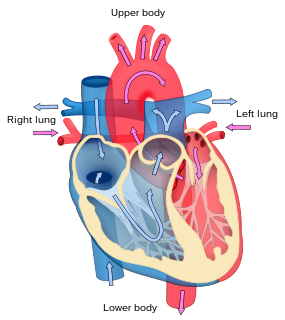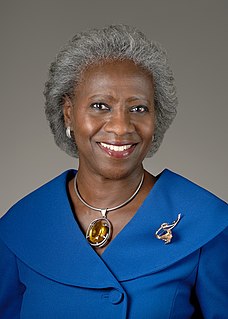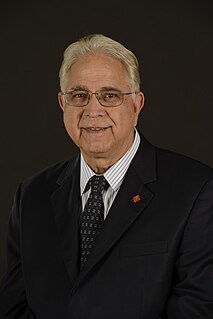
Cardiology is a branch of medicine that deals with disorders of the heart and the cardiovascular system. The field includes medical diagnosis and treatment of congenital heart defects, coronary artery disease, heart failure, valvular heart disease and electrophysiology. Physicians who specialize in this field of medicine are called cardiologists, a specialty of internal medicine. Pediatric cardiologists are pediatricians who specialize in cardiology. Physicians who specialize in cardiac surgery are called cardiothoracic surgeons or cardiac surgeons, a specialty of general surgery.

Hypertension, also known as high blood pressure (HBP), is a long-term medical condition in which the blood pressure in the arteries is persistently elevated. High blood pressure usually does not cause symptoms. Long-term high blood pressure, however, is a major risk factor for stroke, coronary artery disease, heart failure, atrial fibrillation, peripheral arterial disease, vision loss, chronic kidney disease, and dementia. Hypertension is a major cause of premature death worldwide.

Bernadine Patricia Healy was an American cardiologist and the first female director of the National Institutes of Health (NIH).

The University of Alabama at Birmingham Marnix E. Heersink School of Medicine is a public medical school located in Birmingham, Alabama, United States with branch campuses in Huntsville, Montgomery, and at the University of Alabama College of Community Health Sciences in Tuscaloosa. Residency programs are also located in Selma, Huntsville and Montgomery. It is part of the University of Alabama at Birmingham (UAB).
Victor Darley-Usmar is a free-radical biologist and biochemist, the UAB Endowed Professor in Mitochondrial Medicine and Pathology at the University of Alabama at Birmingham. Darley-Usmar also contributed to a book titled Microbes, Bugs & Wonder Drugs, a science book written for young readers and their families.

Alberto Carlos Taquini was an Argentine cardiologist, clinical researcher and academic.
Jeremiah Stamler was an American scientist specializing in preventive cardiology and the study of the influence of various risk factors on coronary heart disease and other cardiovascular diseases, and the role of salt and other nutrients in the etiology of hypertension and coronary heart disease. Stamler is credited with introducing the term "risk factors" into the field of cardiology. In 1988, he was awarded the Donald Reid Medal given by the London School of Hygiene and Tropical Medicine for his contributions to epidemiology. He was professor emeritus of preventive medicine at Northwestern University in Chicago, Illinois. After his retirement from active teaching, he continued his research with his wife Rose until her death in 1998; in his later years he divided his time between Manhattan, Long Island, Chicago, and Pioppi in Southern Italy.
Professor Peter Sleight M.D.(Cantab.), D.M. (Oxon.) FRCP FACC was a distinguished and internationally renowned research cardiologist and an Honorary Consultant Physician at the John Radcliffe Hospital in Oxford and the Oxford University Hospitals NHS Foundation Trust. Sleight was Emeritus Field Marshal Alexander Professor of Cardiovascular Medicine at the University of Oxford and an Emeritus Fellow of Exeter College, Oxford.

Dr. Hannah Valantine is the Chief Officer for Scientific Workforce Diversity at the United States National Institutes of Health.

Jawahar L. Mehta is the Stebbins Chair and Professor of Medicine at the College of Medicine, University of Arkansas for Medical Sciences (UAMS).
Rhian M. Touyz MBBCh, MSc (Med), PhD, FRCP, FRSE, FMedSci, FCAHS is a Canadian medical researcher. She is currently serving as the Executive Director and Chief Scientific Officer of the Research Institute of the McGill University Health Centre in Montreal, Canada, since 2021. A clinician scientist, her research primarily focuses on hypertension and cardiovascular disease.
Karina W. Davidson is senior vice president of research, dean of academic affairs, and head of the center focused on behavioral and cardiovascular health research at Northwell Health She was previously vice-dean of organizational effectiveness and executive director of the Center for Behavioral Cardiovascular Health at Columbia University Medical Center. She was also Chief Academic Officer at NewYork-Presbyterian Hospital in New York City.
Ricardo Luis Armentano Feijoo is an Uruguayan professor and researcher who has worked in biomedical engineering and cardiovascular systems. He currently serves as the director of the GIBIO research group at the National Technological University — Buenos Aires Regional Faculty (Argentina). Also he is the director of the Department of Biological Engineering, University of the Republic (Uruguay). He has two doctoral degrees, two post-doctoral degrees, and has authored more than 300 research articles and 20 books/book chapters.

Harriet Pearson Dustan (1920–1999) was an American physician who is known for her pioneering contributions to effective detection and treatment of hypertension. She was the first woman to serve on the Board of Governors of the American Board of Internal Medicine.
Partho P. Sengupta is an Indian-American cardiologist. He is the Henry Rutgers Professor of Cardiology and Chief of the Division of Cardiovascular Disease & Hypertension at the Robert Wood Johnson Medical School (RWJMS) and the Chief of Cardiology, Robert Wood Johnson University Hospital (RWJUH) since July 1, 2021. Between 2019 and 2021, Dr. Sengupta was the Abnash C. Jain Chair & Professor of Cardiology at West Virginia University School of Medicine and the Chief of Division of Cardiology, Chair of Cardiovascular Innovation and Director of Cardiac Imaging at West Virginia University Heart and Vascular Institute.

Monika M. Safford is an American clinician-investigator. She is the Chief of the Division of General Internal Medicine at NewYork-Presbyterian Hospital and John J. Kuiper Professor of Medicine at Weill Cornell Graduate School of Medical Sciences. Having joined the faculty of the University of Alabama at Birmingham School of Medicine in 2003, Safford was the inaugural Endowed Professor of Diabetes Prevention and Outcomes Research and Assistant Dean for Continuing Medical Education.
Donna K. Arnett is an American epidemiologist and clinical research nurse. After having a stroke at the age of 27, she began focusing her research on epidemiology. In 2019, Arnett was named a World Expert in Hypertension by Expertscape after being in the top 0.076 per cent of scholars writing about hypertension over the previous ten years.
Mona N. Fouad is an Egyptian-American physician. Fouad is the inaugural holder of the Edward E. Partridge, M.D., Endowed Chair for Cancer Disparity Research at the University of Alabama at Birmingham. As a result of her "lifetime of exceptional work in health and medicine," Fouad was also elected a member of the National Academy of Medicine in 2017.
Aletta E. "Alta" Schutte is a South African hypertension and heart disease specialist, who is Principal Theme Lead of Cardiac, Vascular and Metabolic Medicine in the University of New South Wales in Sydney, Australia with a joint appointment as Professorial Fellow at the George Institute for Global Health. She was the Director of Hypertension in Africa Research Team and Director of the Medical Research Council Extramural Unit for Hypertension and Cardiovascular Disease at the North-West University in South Africa. She has fulfilled several leadership roles, including the President of the Southern African Hypertension Society, and President of the International Society of Hypertension.

Jason C. Kovacic is an Australian-born cardiologist and physician-scientist; the Robert Graham Chair and Professor of Medicine, University of New South Wales; Executive Director of the Victor Chang Cardiac Research Institute in Sydney, Australia; and Professor of Medicine (Cardiology) at the Icahn School of Medicine at Mount Sinai, New York.









